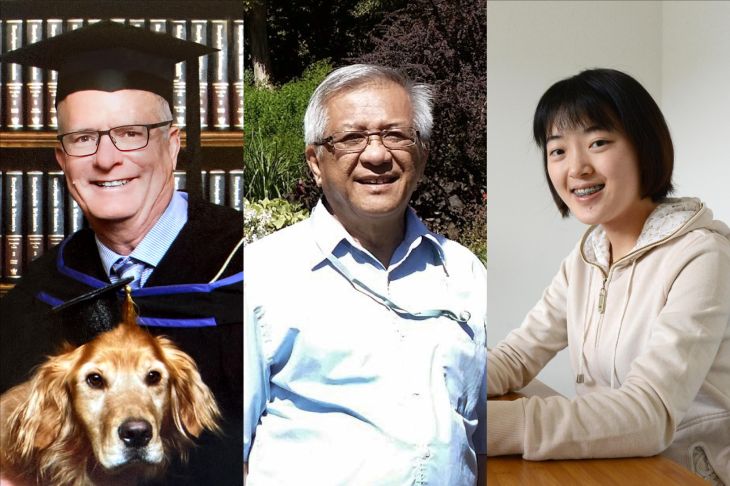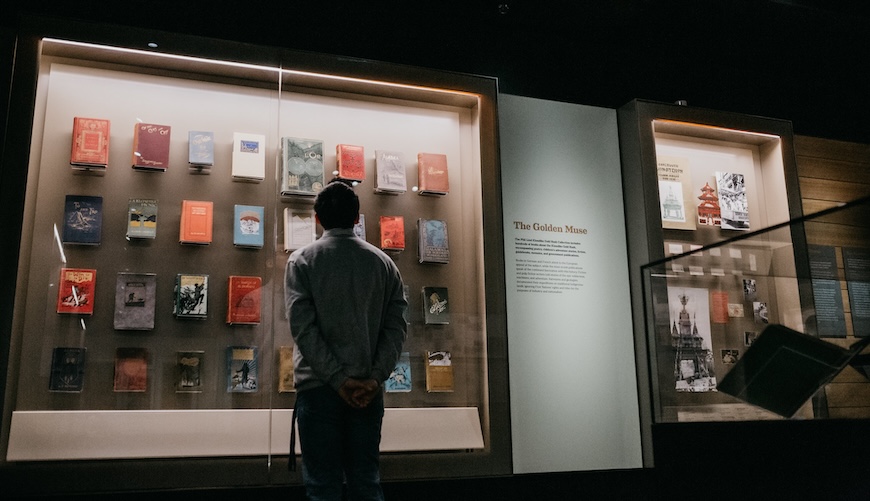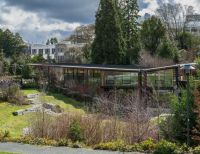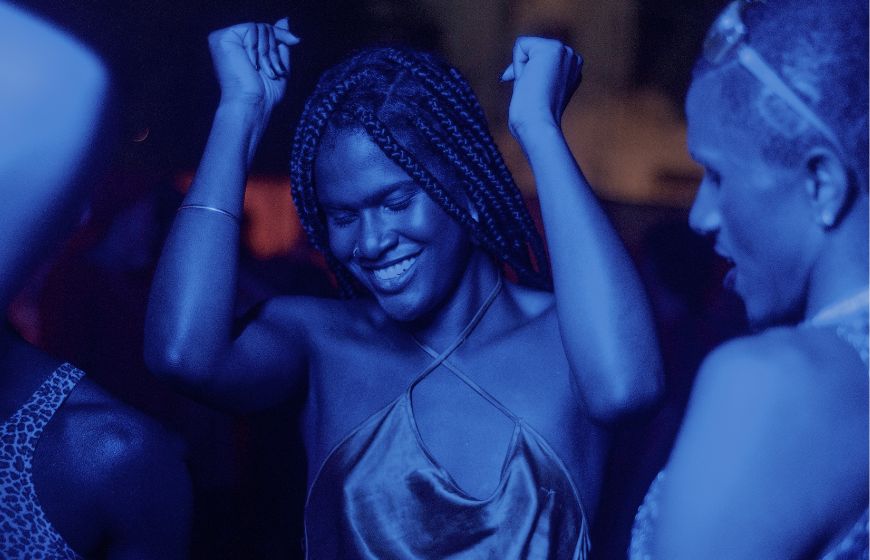UBC celebrates graduates who defy age and time to complete their degrees
University News
It’s graduation season. A time to celebrate the achievements of the diverse graduates at the University of British Columbia.
Among them are the “slowest,” youngest and oldest students. All of whom have fascinating stories of resilience, determination and perseverance. These graduates prove that age and time constraints are no barriers to achieving academic success.
‘UBC finally graduates its slowest student,’ says student who started degree in 1969
A glacial 54 years after he first enrolled, Arthur Ross will finally get his Bachelor of Arts degree at spring graduation.
“The headline on your story should be ‘UBC finally graduates its slowest student,’” the now 71-year-old retiree says with an easy laugh.
Ross enrolled at UBC in 1969, fresh out of Prince of Wales high school in Vancouver, and very much identifying with the counterculture hippie lifestyle of the day.
UBC was a natural choice. His mother attended the university, he had an uncle who was a professor, and other family members had graduated before him.
“It was also close to home. It meant I could stay at home. I wasn’t stupid,” he says.
Initially his plan was to get a degree in English, but by his second year, Ross’s passion for the theatre had fully taken over and he was spending as much time as possible in the theatre department, doing shows and taking courses to pursue his nascent goal of becoming an actor.
“I was besotted with theatre at the time. It was alive then, with a sense of vitality and newness. It seemed just electric to me,” Ross remembers. In the department, Ross would cross paths with renowned Canadian actors such as Nicola Cavendish, Larry Lillo, Brent Carver and Ruth Nichol, inspiring him further to pursue theatre.
Two years into his degree at UBC and with stars in his eyes, Ross left to complete a three-year program at the National Theatre School of Canada in Montreal. But the practical reality of the actor’s life and his assessment of his own proficiency brought him to a painful conclusion.
“I liked it too much. It wasn’t going to be healthy for me. I knew I was a good actor but I always thought you had to be great.”
So he did what any aspiring actor who recognizes they may be outclassed would do in 1975. Ross took his three years of academic work at UBC and went to law school in Toronto, graduated and spent 35 years as a civil litigator in Metro Vancouver before retiring in 2016.
Many people at that stage might look at their life’s experience, career, their children’s success and think, “Time to relax.” But not Ross. The loose thread of that missing BA was begging to be pulled.
So, in November of 2016, he called UBC, got a new student number, and by January of 2017 he was a part-time student focusing on history, with a particular interest in the First World War.
“I simply could not grasp why so many people would be prepared to participate in this butchery,” he explains. “However, the great revelation of pursuing a history degree was not in answering that initial question, but in looking at the sordid nature of Canadian history.”
For six years he worked on his degree, taking part-time courses—one at the height of the COVID-19 pandemic from a remote “outer space” family property near Kamloops. At his age, he was aware he was the oldest person in the classroom (real or virtual). That didn’t matter to Ross.
“I’m appreciative of the students accepting that old guy tuning in from outer space,” he jokes.
The fact that tuition was free due to his age and program choice didn’t hurt either. Ultimately, with his graduation just days away now, Ross (who has donated to the university in recognition of his privilege) is simply grateful for the opportunity.
“It was stimulating. It’s really remarkable in the quality of people they’ve got there in the history department. It’s a jewel and the faculty are simply world-class. I obviously wanted to do it. My advice for someone in a position like mine? Make sure you want to do it, too.”
Arthur Ross will cross the stage and finally accept his degree on May 25.
Youngest student in spring graduation
At just 18, Floria Gu is officially the youngest student to graduate from UBC at this spring graduation.
“I had a lot of anxiety at first about my age,” she recalls of her first weeks on the Vancouver campus in 2019. If anyone asked the computer science student how old she was, Gu would “deflect and change the subject.”
“I don’t really think of it anymore,” she says.
Gu attended elementary school in Metro Vancouver. In 2016 at the age of 12, she applied for and was accepted into the University Transition Program, a Ministry of Education Provincial Resource Program with staffing and administrative oversight provided by the Vancouver School Board and hosted at UBC.
She completed five years of high school curriculum in two years and was ready to embark on her degree program at just 14.
“It was something of a challenge. My high school was very small and UBC is a very large place,” Gu recalls.
But Gu did what she did in elementary school and then in her accelerated high school: She got to work with the support and encouragement of her parents.
“I really just went about my school work to get the best grades I could,” she says.
Along the way Gu found time to explore charcoal sketching, eventually melding her artistic inclinations with her studies by dipping her toe into game development. Now she is looking ahead to pursuing a Master’s degree, specifically in computer graphics.
“It’s good to get good grades and all, but there’s a lot of other things to explore in life,” she says.
As Gu looks back on her time at UBC, her favourite memory is a moment of revelation, sitting in a computer lab, working on her honours thesis examining texture-space shading when suddenly everything clicked and the program worked.
Hopefully she can add being UBC’s youngest graduating student to that memory list when she crosses the stage to accept her degree on May 30.
Five degrees and counting: At 78, UBC’s oldest graduating student has no plans to slow down
Many people would be hesitant to return to school long after they’ve graduated or retired, but not Yee Siong Pang.
At the age of 73, Pang defied the norm by returning to UBC in 2017 to pursue his second UBC degree and his fifth university degree overall, a bachelor of arts in linguistics. At 78, he is now set to graduate on May 26 as the oldest UBC graduate this spring. The oldest graduate in the last 19 years graduated in May 2005 and was 87 years old.
For Pang, this linguistics degree was a retirement project for him. Something he had interest in but never really pursued until later in life.
“I always thought studying linguistics would be an intellectually stimulating and enriching experience. So far, I’ve learned so much about where I live and its culture from taking courses at the linguistics department, particularly about First Nations and Indigenous language revitalization,” says Pang.
Pang was even part of a class project that used artificial intelligence to map out and identify First Nation languages based on online materials. He says this experience considerably shaped his experience about learning linguistics and the role it plays in our life.
Despite being a non-traditional student, Pang settled in quite comfortably.
“I felt welcomed and comfortable in class,” he says. “My peers and instructors didn’t treat me any differently or provide me with any special treatment just because I was an older student.”
Pang had a strong interest in science throughout his life. After obtaining his electrical engineering degree in 1970, he pursued a career as a practicing engineer for 20 years in Malaysia. He then obtained his master of business administration in 1986.
Pang moved to Vancouver in 1992 and transitioned to a career as a physics and mathematics teacher.
“I really enjoyed the sciences and teaching so I thought this would be a good fit,” says Pang.
To pursue this shift, he took courses at various community colleges and worked part-time as a Computer Technology instructor until 2001.
In 2006, Pang obtained his Bachelor of Education degree from Simon Fraser University. He began working as a teacher at adult education centres for the Vancouver School Board from 2007 to 2015, and also earned his Bachelor of Science in mathematics from UBC in 2011.
Although Pang is set to graduate this spring with his linguistics degree, he plans to continue studying computational linguistics on his own and using machine-learning tools to document minority languages.
When asked what advice he would give to anyone interested in returning to school after retirement, Pang said: “Study something you’re interested in and keep at it.”
Interview language(s): English (Gu, Pang, Ross), Cantonese (Pang)
















